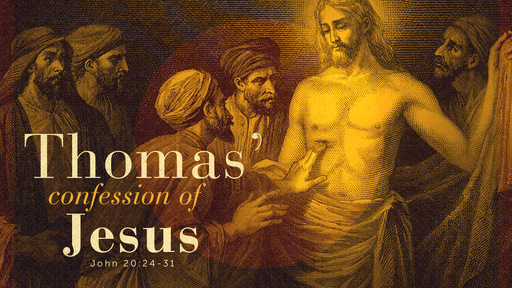Thomas' Confession of Jesus

Sermon • Submitted • Presented • 31:01
0 ratings
· 8 viewsThomas confesses Christ
Files
Notes
Transcript
I. Introduction
I. Introduction
In our Bible study on Wednesday’s we have been drilling down on explaining who Jesus is based on the Scriptures.
In our Bible study on Wednesday’s we have been drilling down on explaining who Jesus is based on the Scriptures.
Specifically, we have lately been dealing with the deity of Christ.
Specifically, we have lately been dealing with the deity of Christ.
Just this past week we examined the apostle Paul’s explanations of who Jesus is.
Just this past week we examined the apostle Paul’s explanations of who Jesus is.
We won’t recap all of that this morning, but we want to connect our Bible study to our Sunday Worship this morning.
We won’t recap all of that this morning, but we want to connect our Bible study to our Sunday Worship this morning.
We want to examine the apostle Thomas’ confession of Jesus from John 20:24–31 and see how that should inform our own confession of Jesus today.
We want to examine the apostle Thomas’ confession of Jesus from John 20:24–31 and see how that should inform our own confession of Jesus today.
II. Some Background for Thomas’ confession (John 20:24-25)
II. Some Background for Thomas’ confession (John 20:24-25)
16 So Thomas, called the Twin, said to his fellow disciples, “Let us also go, that we may die with him.”
This passage dispels any notion that Thomas was a doubter, a naysayer, or a half hearted follower of Jesus.
This passage dispels any notion that Thomas was a doubter, a naysayer, or a half hearted follower of Jesus.
1 “Let not your hearts be troubled. Believe in God; believe also in me.
2 In my Father’s house are many rooms. If it were not so, would I have told you that I go to prepare a place for you?
3 And if I go and prepare a place for you, I will come again and will take you to myself, that where I am you may be also.
4 And you know the way to where I am going.”
5 Thomas said to him, “Lord, we do not know where you are going. How can we know the way?”
Thomas believed in Jesus, just like the other disciples did but was not shy about seeking clarity from Jesus when he didn’t understand what was going on.
Thomas believed in Jesus, just like the other disciples did but was not shy about seeking clarity from Jesus when he didn’t understand what was going on.
24 Now Thomas, one of the twelve, called the Twin, was not with them when Jesus came.
25 So the other disciples told him, “We have seen the Lord.” But he said to them, “Unless I see in his hands the mark of the nails, and place my finger into the mark of the nails, and place my hand into his side, I will never believe.”
III. Jesus Appears to Thomas (John 20:26-27)
III. Jesus Appears to Thomas (John 20:26-27)
26 Eight days later, his disciples were inside again, and Thomas was with them. Although the doors were locked, Jesus came and stood among them and said, “Peace be with you.”
27 Then he said to Thomas, “Put your finger here, and see my hands; and put out your hand, and place it in my side. Do not disbelieve, but believe.”
III. Thomas’ confesses his belief in Christ (John 20:28-29)
III. Thomas’ confesses his belief in Christ (John 20:28-29)
28 Thomas answered him, “My Lord and my God!”
Thomas assigns to Jesus two divine titles or designations:
Thomas assigns to Jesus two divine titles or designations:
1. Lord
1. Lord
Carson Quote: (3) The use of kyrios (‘lord’) for both common courtesy (e.g. v. 15) and in addressing God himself facilitated the development of Christological understanding. (4) In any case, kyrios is an early post-resurrection title (e.g. Rom. 10:9; 1 Cor. 12:3; Phil. 2:9–11), and because it is used of God himself in the lxx, in many of its occurrences it cannot be considered less elevated than theos (‘God’). (D. A. Carson, The Gospel according to John, The Pillar New Testament Commentary (Leicester, England; Grand Rapids, MI: Inter-Varsity Press; W.B. Eerdmans, 1991), 658.)
2. God
2. God
Lou/Nida Definition: the one supreme supernatural being as creator and sustainer of the universe—‘God.’
Jesus has revealed his true identity as both Lord (κύριος [kurios], used by the LXX to translate Yahweh) and God (θεός [theos], used by the LXX to translate Elohim)
29 Jesus said to him, “Have you believed because you have seen me? Blessed are those who have not seen and yet have believed.”
IV. John’s purpose in writing his book (John 20:30-31)
IV. John’s purpose in writing his book (John 20:30-31)
30 Now Jesus did many other signs in the presence of the disciples, which are not written in this book;
31 but these are written so that you may believe that Jesus is the Christ, the Son of God, and that by believing you may have life in his name.